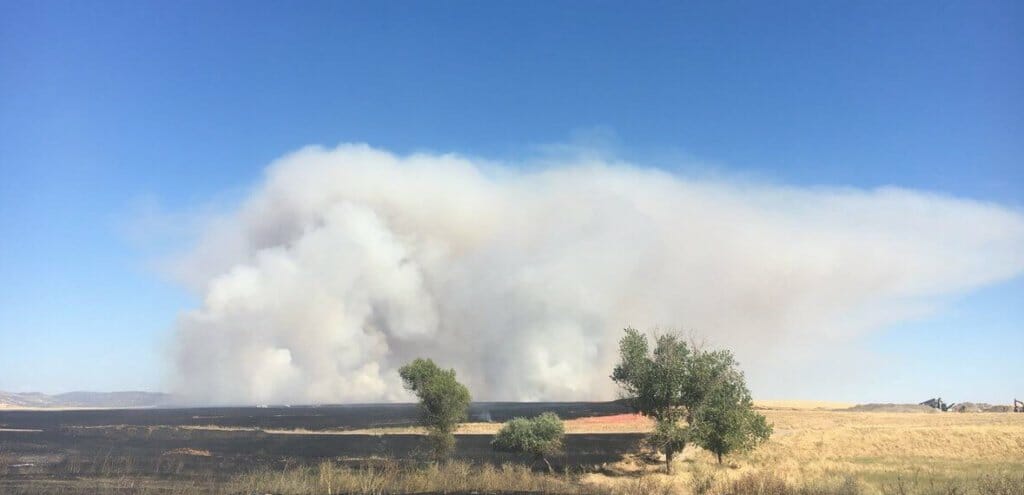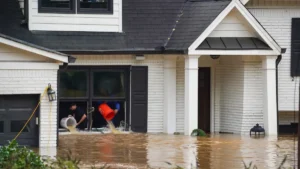Suicide Risk May Rise as Heat Increases
High temperatures do more than raise tempers and stoke conflicts. They are also linked to depression, mental instability and a higher suicide risk. California wildfire, 2018: Rising heat is linked to a higher suicide risk. (CALFIRE / Wikimedia Commons)
California wildfire, 2018: Rising heat is linked to a higher suicide risk. (CALFIRE / Wikimedia Commons)
A new study suggests that hot weather’s adverse effects on some people can include a heightened suicide risk. While the rise is numerically small today, the increase in extreme heat expected later this century could have starker consequences.
Californian scientists have looked at 50 years of records to establish a link between higher-than-usual temperatures and suicide rates in the United States and Mexico.
They found that a 1°C rise above average temperatures could be linked to a tiny increase – just 0.68% – in suicides in the US and by 2.1% south of the border. The rise is small. But it means that if the pattern of heat extremes predicted under all global warming scenarios continues to 2050, then there could be an additional 21,000 acts of suicide.
The same study, in Nature Climate Change, also identified a tendency to respond depressively: in such hot spells, people who used the social media platform Twitter were more likely to employ telltale words such as “lonely” or “trapped” or “suicidal”.
Scientists have already repeatedly established that heat extremes can be lethal, and will multiply as the world warms, directly as a consequence of profligate human combustion of fossil fuels.
The Californian scientists looked at official death records county by county in the US from 1968 to 2004, and across municipalities in Mexico from 1990 to 2010. They then matched these with temperature records by day and by month for those locations.
They also checked 600 million Twitter updates that could be identified as coming from a particular place and combed them for evidence of what they call “depressive feelings.” And they found a link between temperature and low spirits, as well as between temperature and suicide rates.
If extended to temperatures likely by 2050, suicide rates could increase in the US by 1.4% and in Mexico by 2.3%. And that could add up to an extra 9,000 deaths at the very least, or as many as 44,000.
“Surprisingly, these effects differ very little based on how rich populations are or if they are used to warm weather,” said Marshall Burke, an economist at Stanford University.
“Suicide is one of the leading causes of death globally, and suicide rates in the US have risen dramatically over the last 15 years. So better understanding of the causes of suicide is a public health priority.”
Human impact
Dr Burke and one of his co-authors, Solomon Hsiang of Berkeley University, have repeatedly focused on the human consequences of climate change. Dr Burke has already established that even small reductions in global warming could deliver huge benefits to society.
Separately, Dr Hsiang has warned that global warming could bring poverty even worse than the 1930s Depression for many in the US, and that politicians were ignoring evidence of the sheer social cost precipitated by climate change, not least because rising temperatures make violence and social conflict ever more likely.
Working together, they have also warned that rising temperatures could be associated with lower incomes and productivity, and that with every shift in temperature, there is a link to levels of violence in conflicts worldwide.
“We’ve been studying the effects of warming on conflict and violence for years, finding that people fight more when it’s hot,” said Dr Hsiang. “Now we see that, in addition to hurting others, some individuals hurt themselves. It appears that heat profoundly affects the human mind and how we decide to inflict harm.”
And Dr Burke said: “Hotter temperatures are clearly not the only, nor the most important, risk factor for suicide. But our findings suggest that warming can have a surprisingly large impact on suicide risk, and this matters for both our understanding of mental health as well as for what we should expect as temperatures continue to warm.”
Your support is crucial…With an uncertain future and a new administration casting doubt on press freedoms, the danger is clear: The truth is at risk.
Now is the time to give. Your tax-deductible support allows us to dig deeper, delivering fearless investigative reporting and analysis that exposes what’s really happening — without compromise.
Stand with our courageous journalists. Donate today to protect a free press, uphold democracy and unearth untold stories.









You need to be a supporter to comment.
There are currently no responses to this article.
Be the first to respond.